NOTE: For prior parts in The Archivist series you can view an archive of it all here. And for his older series see: Musings of an Iraqi Brasenostril on Jihad.
—
26 Unseen Islamic State Administrative Documents: Overview, Translation & Analysis
By Aymenn Jawad Al-Tamimi
Introduction
Of all jihadist groups, the Islamic State [IS] by far has presented the most comprehensive, ostensible bureaucratic structure as part of its claimed state project, embodied foremost in a system of diwans (government departments) since the declaration of the Caliphate in June 2014. The best means to analyse the nuances of this set-up is through looking at documents issued by these departments that have not been officially released in IS’ media outlets.
Here, numerous shades emerge that go beyond simple statements such as ‘IS provides services.’ For example, one pattern in the documents from the IS takeover of parts of Iraq is that the Diwan al-Khidamat (services department) in a given city is normally composed of the same staff, workers and offices of already existing government service offices in that city. It is simply that the personnel have been compelled to return to work under threat of confiscation of their homes. For a more in-depth survey, see my recent paper in the academic journal Perspectives on Terrorism primarily based on my current archive of IS documents and other collections of mine currently totalling over 200 specimens.
This post presents 26 further documents not previously in the public domain, obtained from a businessman from a town in northeast Aleppo province that is currently a stronghold of IS. For reasons that are self-evident, this person’s exact location and identity cannot be revealed, but it may be added that this person does business across IS territory, including regular trips to Mosul and Anbar. Though not necessarily a hardline, ideological supporter of IS, he nonetheless finds the security environment amenable to doing business: a common advantage perceived by Syrians who make investments and conduct transactions in IS territory.
Islamic State vs. Jabhat al-Nusra Administration
Before proceeding to the selection of documents, one question worth pondering- first suggested to me by Aaron Zelin- is comparing the IS administration with that of Jabhat al-Nusra, Syria’s al-Qa’ida affiliate. To put it briefly, Jabhat al-Nusra’s administrative structures lack the same sense of comprehensiveness and consistency. Jabhat al-Nusra does not have the same level of contiguous territory and urban strongholds, and the extent of its presence varies considerably from one place to another. Further, Jabhat al-Nusra is not claiming yet to be a state.
The main Jabhat al-Nusra administrative bodies that can be identified are the Dar al-Qada (Judicial Body), the Maktab al-Da’wa wa al-Irshad (Da’wa and Guidance Office) and al-Idarat al-Aama lil-Khidamat (Public Administration for Services). Broadly speaking, the Dar al-Qada corresponds to IS’ Diwan al-Qada wa al-Mazalim and Diwan al-Hisba, dealing with legal matters such as real estate and enforcement of Shari’a justice (including harsher hudud punishments like stoning fornicators to death), while the Maktab al-Da’wa wa al-Irshad corresponds to IS’ Diwan al-Da’wa wa al-Masajid (Da’wa and Mosques department), and al-Idarat al-Aama lil-Khidamat to the Diwan al-Khidamat.
However, these bodies do not exist in every place where Jabhat al-Nusra has a presence, and sometimes functions are blurred. The Dar al-Qada can be clearly identified in Idlib towns controlled by Jabhat al-Nusra, such as Sarmada, Salqin and Darkush, but in at least one instance the Dar al-Qada seems to have assumed entered into the realm of provision of public services, with the undertaking of a project to reform the main road in Sarmada. Even so, evidence suggests that Jabhat al-Nusra continues to allow civilian local and service councils in Sarmada to operate and provide services such as fixing water pumping lines, contrasting with IS co-optation of such bodies in cities like Raqqa whereby they only have the Diwan al-Khidamat label now. More recently, as part of the Jaysh al-Fatah coalition that has driven the regime out of all major towns in Idlib province since the spring, Jabhat al-Nusra has agreed with the other factions in Jaysh al-Fatah on the formation of a judicial council that is supposed to be “independent in its decisions and rulings, with no right for any faction to intervene in it.” The council is also supposed to unify judiciary authority in all areas liberated at the hands of Jaysh al-Fatah. This development comes amid complaints from the Islamic Commission for the Administration of Liberated Areas (mainly linked to Ahrar al-Sham) that some members of Jabhat al-Nusra have attacked its branches in places like Kafr Nabl.
Moving to Aleppo province, one will note the Dar al-Qada branch in Hureitan, which claims authority also over Kafr Hamra and Anadan. Here the Dar al-Qada is undoubtedly supported by the jihadi coalition Jabhat Ansar al-Din that has a presence in these towns (most notably the coalition’s main component Jaysh al-Muhajireen wa al-Ansar). Further up north in Azaz, the Jabhat al-Nusra presence has been limited to bases with control of one of the mosques in the town (the Mus’ab ibn Umair mosque), railing against the public school system in Azaz and offering alternative education for children.
Nevertheless, with talk of the establishment of a U.S.-Turkish safe zone stretching from Azaz to Jarabulus in the north Aleppo countryside, Jabhat al-Nusra has evacuated most of its bases in the Azaz area and is primarily operating as a small military force to provide limited reinforcements for the rebels fighting IS to the east of Azaz (these rebels being primarily the Levant Front and Ahrar al-Sham, with smaller contributions from mainly Levant Front break-offs like Thuwar al-Sham and Jaysh al-Mujahideen elements). These Jabhat al-Nusra members on the frontlines are mostly locals, while the remainder have already gone to Idlib province.
Thus it can be seen how much more complex the picture is with Jabhat al-Nusra administration. The bodies do not have a uniform presence and the group’s approach seems split between a more hardline approach embodied in the rise of the Dar al-Qada and the more traditional picture of Jabhat al-Nusra as a faction willing to work with others in administration. In 2013 what was then the Islamic State in Iraq and al-Sham (ISIS) indulged in the latter to a degree in the occasional issuing of joint statements for defensive projects and the like.
The Documents
Below, each document is translated and notes provided where applicable.
Specimen A: Activities of the services office, Manbij, Aleppo
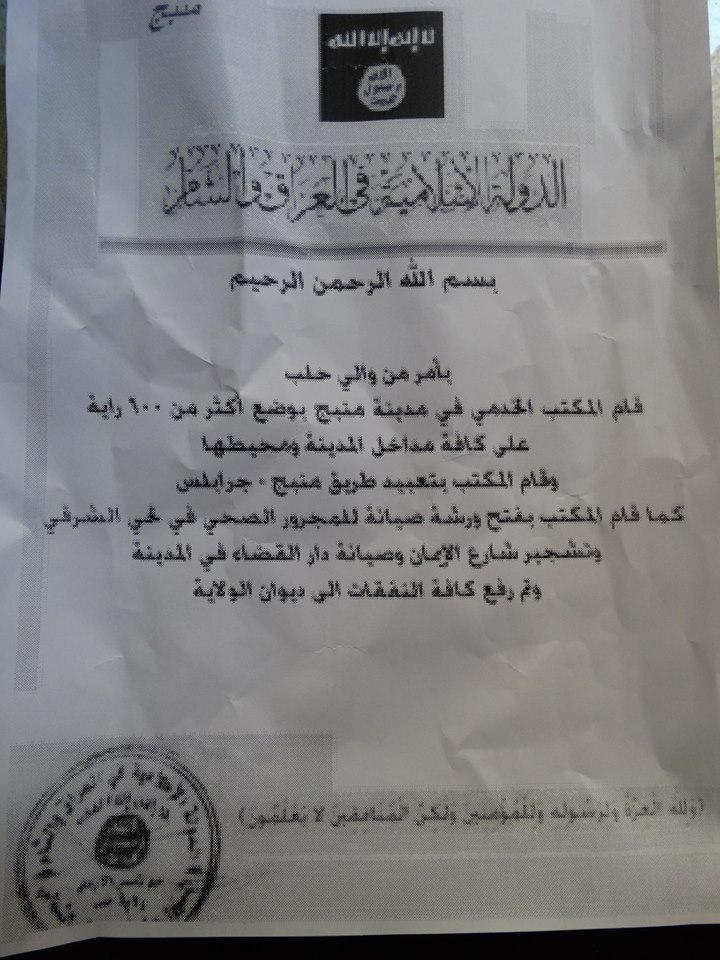
Manbij
Islamic State in Iraq and al-Sham
In the name of God, the Compassionate, the Merciful
By order of the wali [provincial governor] of Aleppo, the services office in the town of Manbij has placed more than 600 flags on all the entrances to the town and its surrounding. The office has also made the Manbij-Jarabulus road passable for traffic, and has opened a maintenance workshop for the sewage system in the eastern quarter, has planted trees on al-Imaan street, and has done maintenance work on the Dar al-Qada in the town. And all the expenses have been referred to the Diwan al-Wilaya.
And glory belongs to God, His Messenger and the believers but the hypocrites don’t know it.
Islamic State in Iraq and al-Sham
Abu [?] Al-Azadi
Wilayat Halab
Notes: Dating uncertain. The ‘Diwan al-Wilaya’ (Province Department) appears to be the same as the “General Administration” (al-Idarat al-Aama) for a given Islamic State province. A similar interchange of names can be observed in some documents regarding healthcare labelled ‘Diwan al-Siha’ (Health Department) and others labelled ‘al-Idarat al-Tibbiya’ (Medical Administration).
Specimen B: Prohibition on hoarding of goods, Yarmouk, Damascus
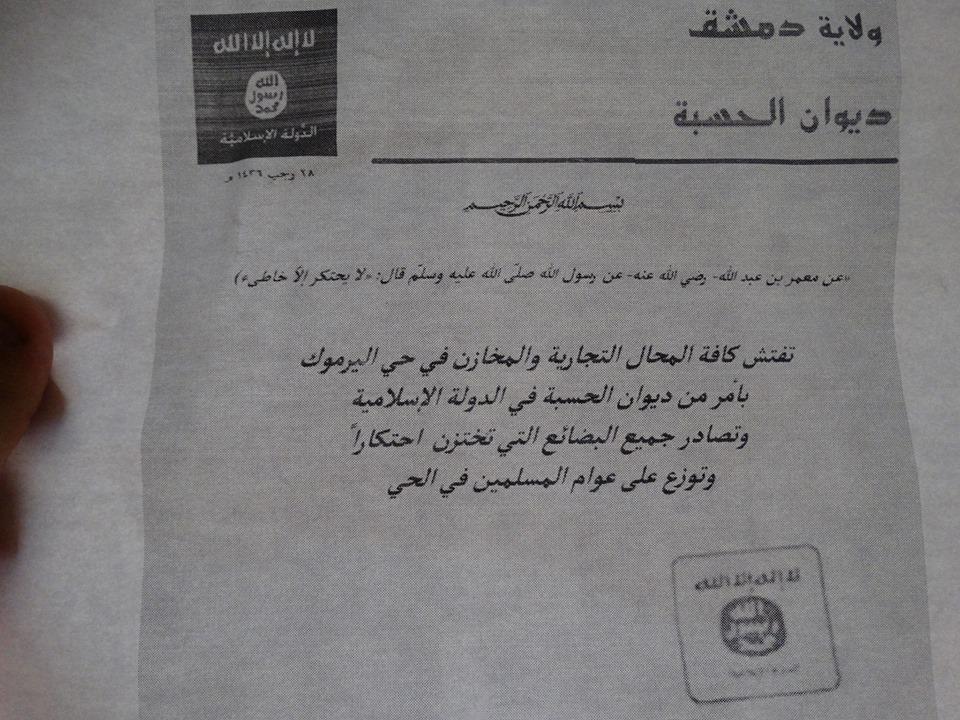
Islamic State
Wilayat Dimashq
Diwan al-Hisba
28 Rajab 1436 AH [17 May 2015]
In the name of God, the Compassionate, the Merciful
On the authority of Mu’ammar bin Abdullah- may God be pleased with him- from the Messenger of God (SAWS): he said: “One does not hoard except in error.”
All shops and storages in al-Yarmouk quarter are to be inspected by order of the Diwan al-Hisba in the Islamic State, and all goods being stored in hoarding will be confiscated and distributed to the Muslim populace.
Notes: Evidently in response to the dire shortage of basic commodities in Yarmouk on account of the regime siege.
Specimen C: Payment for completion of road project between Albukamal and al-Qa’im
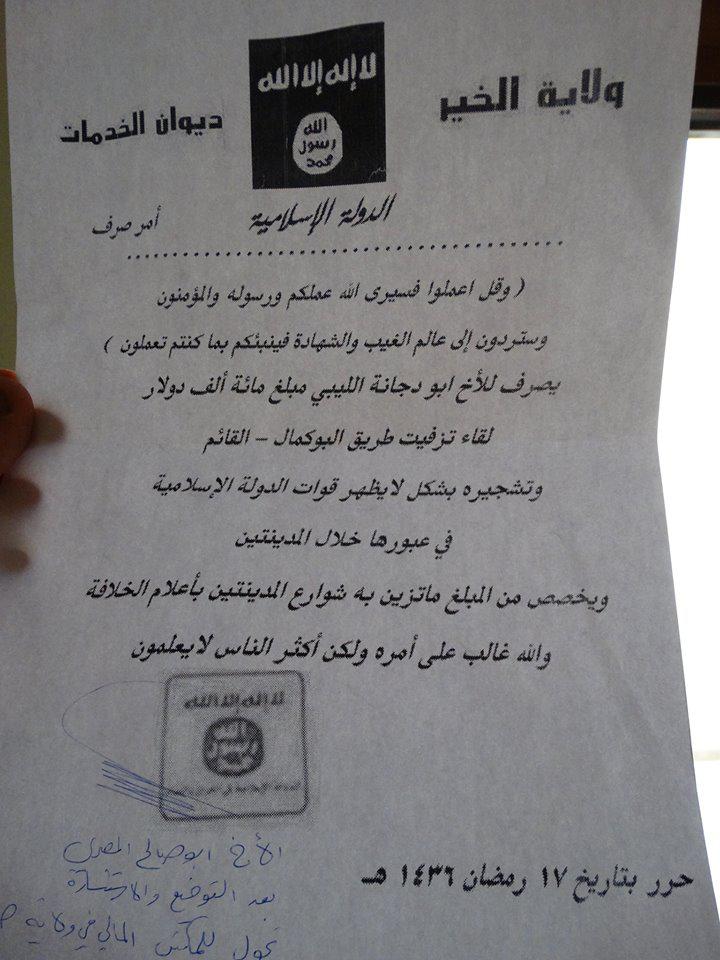
Islamic State
Wilayat al-Kheir
Diwan al-Khidamat
Payment Order
“And say: ‘Work, for God will observe your deeds, as will His Messenger and the believers, and you will be rendered to the One who knows the Unseen and Seen, then He will inform you of what you were doing.’” [Qur’an 9:105]
The brother Abu Dujana al-Libi [the Libyan] is to be paid a sum of $100,000 for asphalting the Albukamal-al-Qa’im road and planting with it trees so as not to expose the forces of the Islamic State in their crossing through the two towns. Also designated from the sum is that by which the streets of the two towns were decorated with the banners of the Caliphate. And God is predominant over His affair but most people don’t know it.
Published on 17 Ramadan 1436 AH [5 July 2015].
Notes: Observe the Islamic State in Iraq and al-Sham stamp on the bottom even though this document dates from after the Caliphate declaration. Occasionally these discrepancies in stamps come up. The payment in U.S. dollars is also noteworthy: currently the three currencies used in IS territory are Syrian pounds, Iraqi dinars and U.S. dollars. Despite all the hype about a new IS currency, no documents attest to any practical use for it. Indeed, it would not be viable as interaction between IS and the outside world is still essential for the continued cash flow and revenue streams for IS. Finally, despite the Deir az-Zor province labelling for the document, al-Qa’im and Albukamal are part of the IS-created ‘Euphrates Province’ spanning the Iraq-Syria borders.
Specimen D: Preparations for the town of Sawran, Aleppo
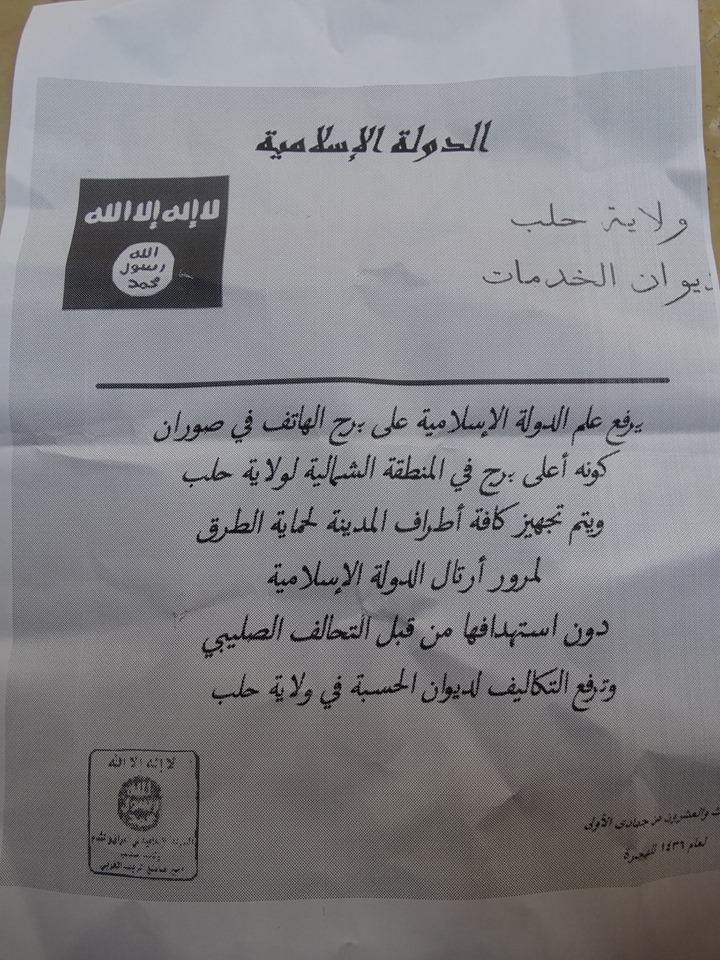
Islamic State
Wilayat Halab
Diwan al-Khidamat
The flag of the Islamic State is to be raised on the phone tower in Sawran as it is the highest tower in the northern region of Wilayat Halab. And all sides of the town are to be prepared to protect the roads for the passing of the Islamic State’s convoys without their being targeted by the Crusader alliance, and the expenses are to be referred to the Diwan al-Hisba in Wilayat Halab.
Notes: Sawran is a small town to the east of Azaz that once had a Hizb-ut-Tahrir presence. Sawran came under the control ISIS following its seizure of Azaz in the fall of 2013, but was abandoned following its withdrawal to the east of Aleppo province in February 2014, seeing as how these places were isolated from its contiguous holdings and were not viable to hold. The Northern Storm Brigade, which had then joined the Islamic Front, returned to Azaz and Sawran. As IS made advances in north Aleppo countryside in summer 2014, the Northern Storm Brigade was responsible for manning the Sawran-Ahtimilat frontline. This remained static until IS’ offensive in late May this year that most notably seized Sawran, which the rebels have since been unable to recover. The raising of the banner on the phone tower was advertised in official IS propaganda.
Specimen E: Prohibition on moving and doing business with historical artefacts in found in Palmyra
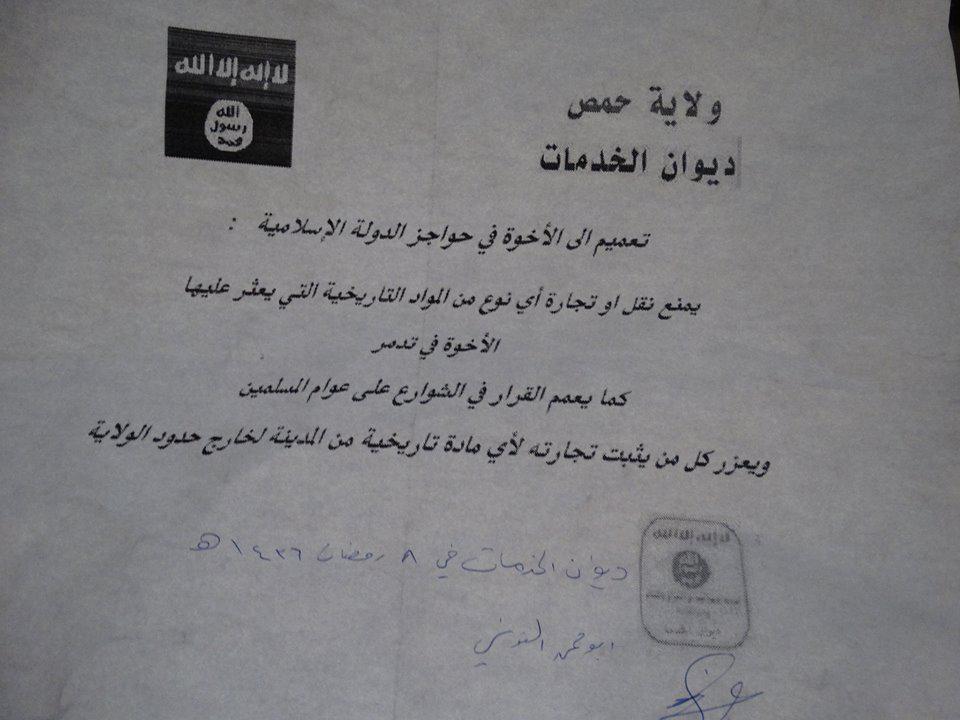
Wilayat Homs
Diwan al-Khidamat
Statement for distribution to the brothers in the Islamic State checkpoints:
It is forbidden to move or deal in any type of historical artefacts that the brothers find in Tadmur. The decision has been similarly spread in the streets to the Muslim populace. All shown to be dealing in any historical artefact from the town for outside the borders of the wilaya will be reprimanded.
Diwan al-Khidamat: 8 Ramadan 1436 AH [25 June 2015]
Abu Muhammad al-Tunisi [the Tunisian]
Notes: Recall that IS advertised the smashing of statues that had been smuggled from Palmyra, though those statues would have been destroyed anyway for idolatry. The attempt here to stop smuggling of artefacts from Palmyra is to be noted alongside licenses for excavation that have been uncovered elsewhere in IS territory under the ‘antiquities administration/division’ that belongs to the Diwan al-Rikaz [‘Precious Resources’ department], under which some smuggling of artefacts has undoubtedly taken place.
Specimen F: Sewage Works, Damascus Province
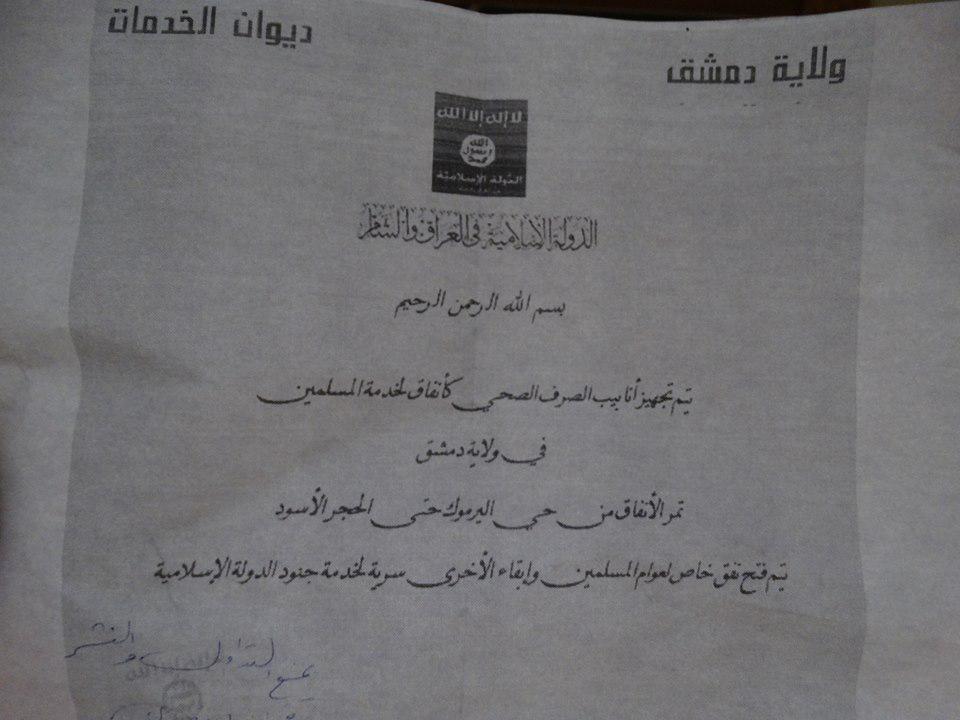
Wilayat Dimashq
Diwan al-Khidamat
In the name of God, the Compassionate, the Merciful
Sewage pipes are being prepared as tunnels for the service of the Muslims in WIlayat Dimashq. These tunnels pass from Yarmouk quarter to al-Hajr al-Aswad quarter. A special tunnel is being opened for the Muslim populace and the others are being preserved for the private service of the soldiers of the Islamic State.
Notes: Exact dating uncertain but probably around the same time as Specimen B. Note how IS soldiers are often in a class of their own: cf. in my archive Specimen 60 that makes an exception on recording IDs of Islamic State soldiers who use the Internet.
Specimen G: Repentance Document, Ninawa Province
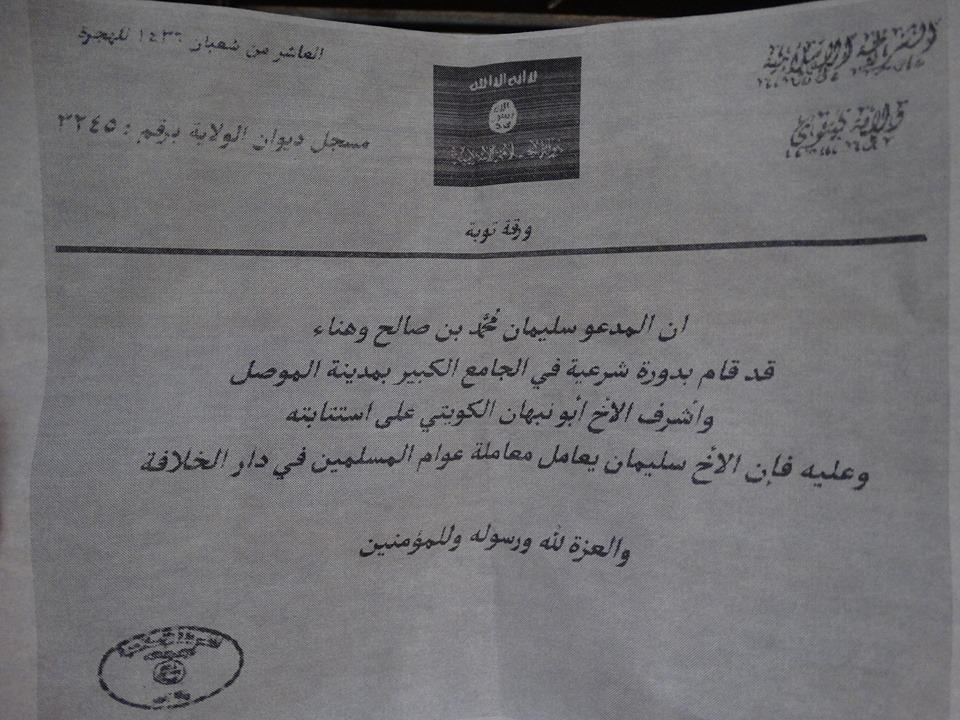
Islamic State
Wilayat Ninawa
10 Sha’aban 1436 AH [28 May 2015]
Recorded with the Diwan al-Wilaya with no. 3245
Repentance Document
The one called Suleiman Muhammad bin Saleh Wahna’ has undertaken a Shari’a lesson in the Grand Mosque in the city of Mosul. And the brother Abu Nabhan al-Kuwaiti [of Kuwait] has overseen his repentance. And thus the brother Suleiman is to be treated as of the Muslim populace.
And glory belongs to God, His Messenger and the believers.
Notes: cf. Specimen A on the Diwan al-Wilaya
Specimen H: Educational Regulations, Deir az-Zor Province
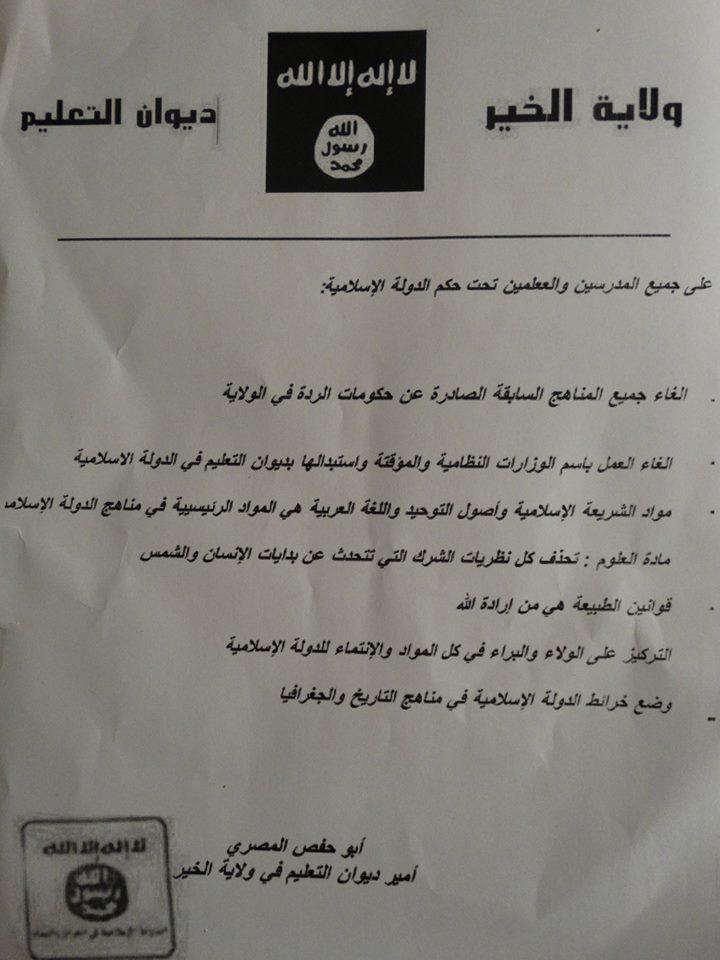
Wilayat al-Kheir
Diwan al-Ta’aleem
All lecturers and teachers under the rule of the Islamic State must adhere to the following:
– Cancel all prior programs issued by the apostasy governments.
– Cancel work in the name of the regime and interim ministries and replace them with Diwan al-Ta’aleem
– The subjects of Islamic Shari’a, principles of tawheed, and the Arabic language are the main subjects in the Islamic State’s programs.
– The sciences: all theories of shirk [idolatry] that speak about the beginnings of man and the Sun are to be done away with. The laws of nature are from God’s will.
– Focus on al-wala’ and al-bara’ [loyalty and disavowal] in all subjects and belonging to the Islamic State
– Putting the maps of the Islamic State in the history and geography programs.
Abu Hafs al-Masri [the Egyptian]
Head of the Diwan al-Ta’aleem in Wilayat al-Kheir
Notes: Nothing particularly surprising here. It seems that muhajireen play a disproportionate role in the management of the Diwan al-Ta’aleem at the provincial and central level in the Islamic State. The “interim” ministry refers to the Syrian opposition interim government: repentance from this system is necessary too.
Specimen I: Confiscation of a person’s property in Deir az-Zor province for not paying zakat
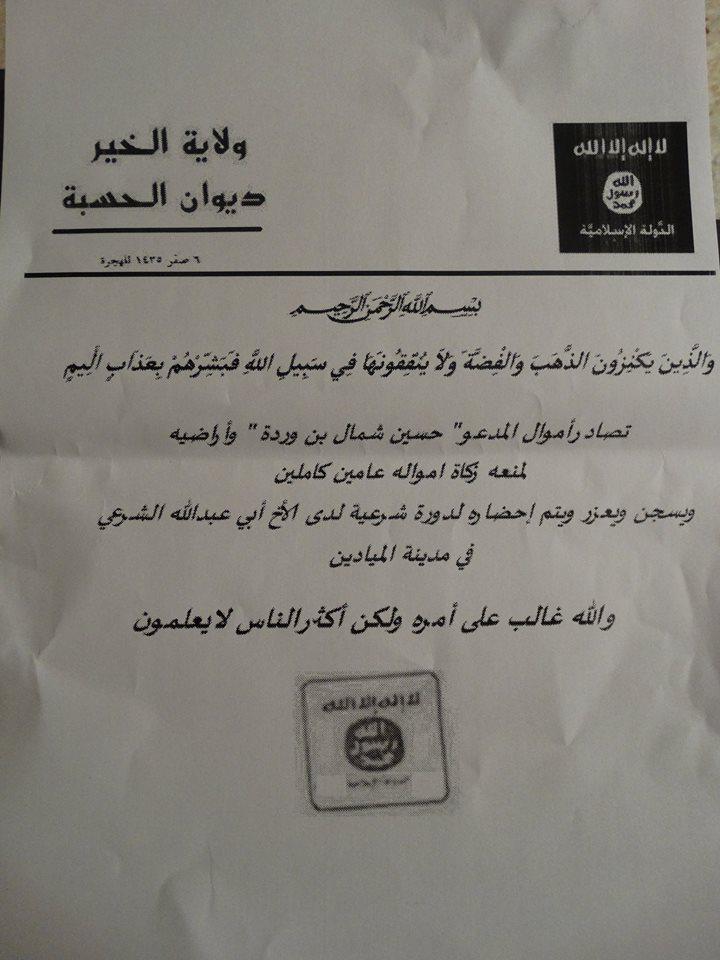
Islamic State
Wilayat al-Kheir
Diwan al-Hisba
6 Sufr 1435 AH [sic.]
In the name of God, the Compassionate, the Merciful
And those who hoard up gold and silver and do not spend it in the path of God, inform them of a painful torment [Qur’an 9:34].
The property and lands of the one called ‘Hussein Shamal bin Warda’ are to be confiscated for his refusal to pay the zakat of his wealth for two years. And he will be imprisoned, rebuked and made to attend a Shari’a session with the brother Abu Abdullah al-Shari’i [Shari’a official] in the town of Mayadeen.
And God is predominant over His affair but most people don’t know it.
Notes: Dating should be Sufr 1436 AH [c. late November 2014]. Logically, the wholesale confiscation follows from taking half of a person’s wealth for refusal to pay in one year.
Specimen J: Prohibition on circulating published material not issued by the Islamic State, Damascus
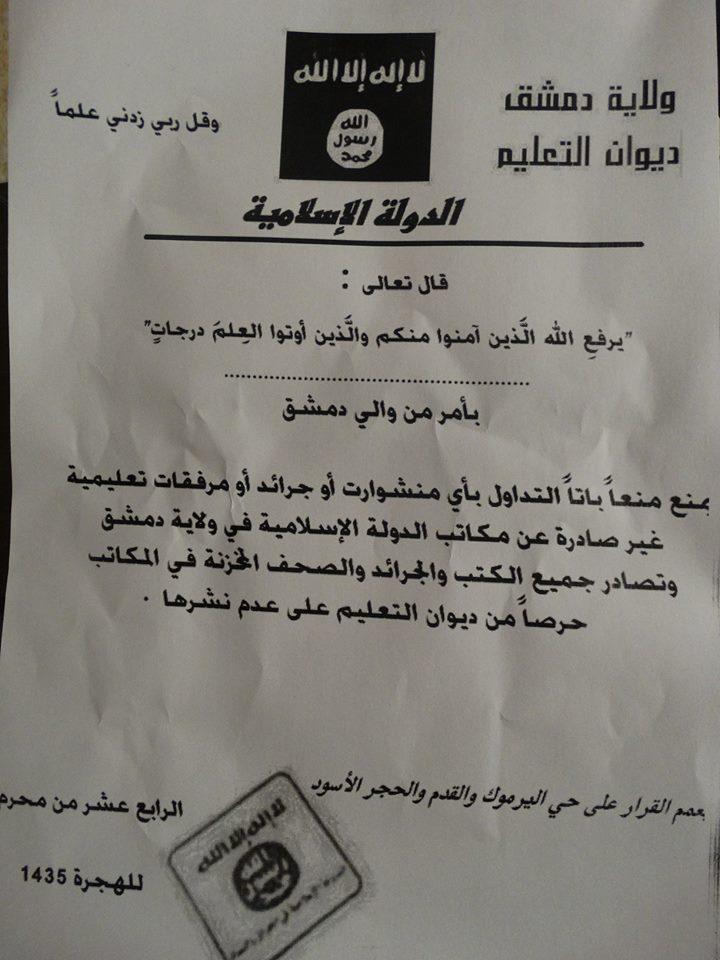
Islamic State
Wilayat Dimashq
Diwan al-Ta’aleem
“And say: My Lord, increase me in knowledge” [Qur’an 20:114]
The Almighty has said: “God will elevate those of you who have believed and been given knowledge by degrees” [Qur’an 58:11].
By order of the wali of Damascus
It is absolutely forbidden to circulate any publications, newspapers or educational schedules not issued by the Islamic State offices in Wilayat Dimashq. And all books, newspapers and stored newspapers will be confiscated in the offices and held by the Diwan al-Ta’aleem so as not to spread them.
The decision applies to al-Yarmouk quarter, al-Qadam and al-Hajr al-Aswad
14 Muharram 1435 AH [sic.]
Notes: Ignore incorrect dating (probably from recycled material). Likely issued around same time as Specimen B.
Specimen K: New educational regulations for Palmyra
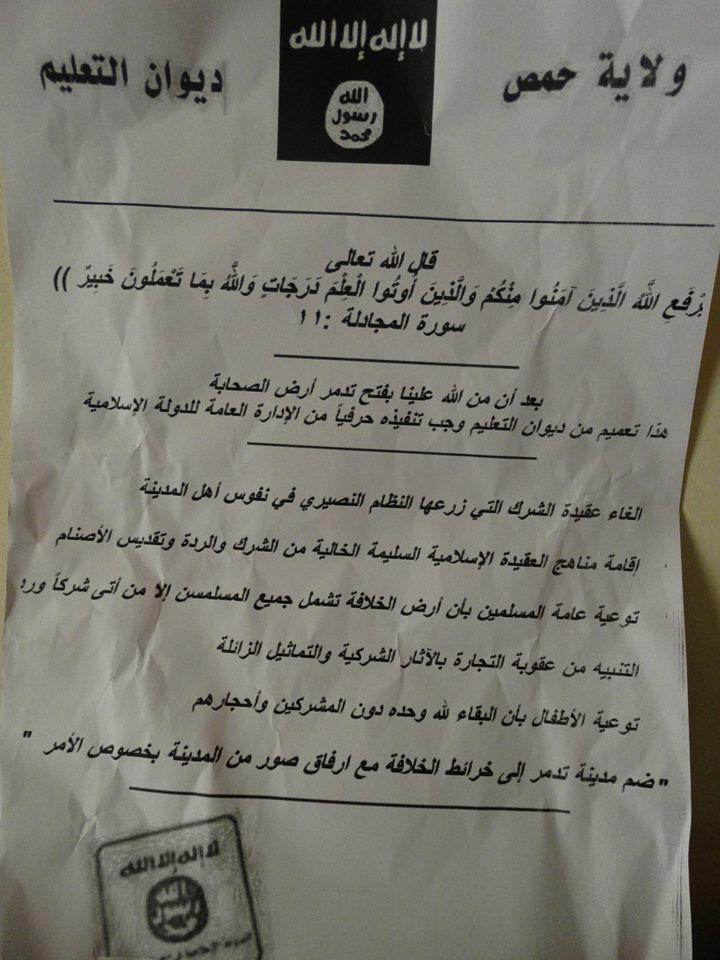
Wilayat Homs
Diwan al-Ta’aleem
God Almighty has said: “God will elevate those of you who have believed and been given knowledge by degrees, and God is well-aware of what you do”- Surat al-Majadala 11 [Qur’an 58:11].
After God blessed us with the conquest of Tadmur, the land of the Compasnions. This is a statement for distribution from the Diwan al-Ta’aleem that must be implemented to the letter from the General Administration for the Islamic State.
. Cancel the doctrine of shirk that the Nusayri regime cultivated in the souls of the people of the town.
. Establish correct Islamic doctrine free of shirk, apostasy, and sanctifying of idols.
. Making the Muslim populace aware that the land of the Caliphate encompasses all the Muslims except whoever comes upon shirk and apostasy.
. Warning of the consequences for dealing in idolatrous antiquities and ephemeral statues.
. Making children aware that one remains for God alone without the mushrikeen and their idols/stones.
“Adding the town of Tadmur to the maps of the Caliphate with provision of photos from the town with regards to the matter.”
Specimen L: Educational regulations, Aleppo province
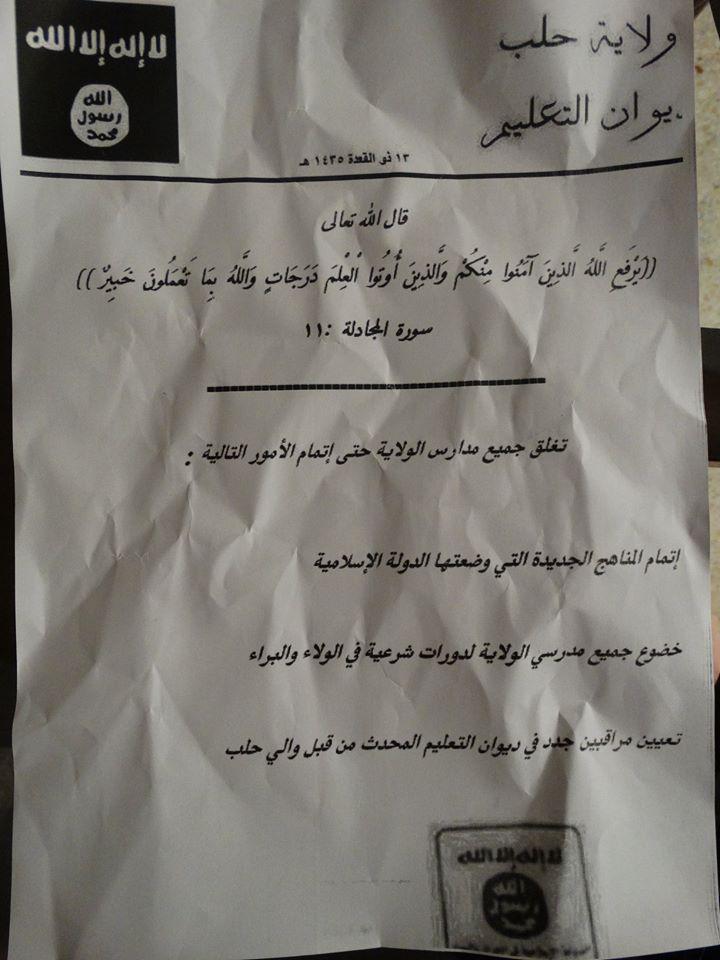
Wilayat Halab
Diwan al-Ta’aleem
13 Dhu al-Qa’ada 1435 AH [8 September 2014]
God Almighty has said: “God will elevate those of you who have believed and been given knowledge by degrees, and God is well-aware of what you do”- Surat al-Majadala 11 [Qur’an 58:11].
All schools of the wilaya are to be closed until fulfilment of the following matters:
. Fulfillment of the new programs put in place by the Islamic State
. Subjecting all teachers of the wilaya to Shari’a lessons in al-wala’ wa al-bara’
. Appointing new overseers in the current Diwan al-Ta’aleem by the wali of Aleppo.
Specimen M: On women’s travel and dress, Raqqa Province
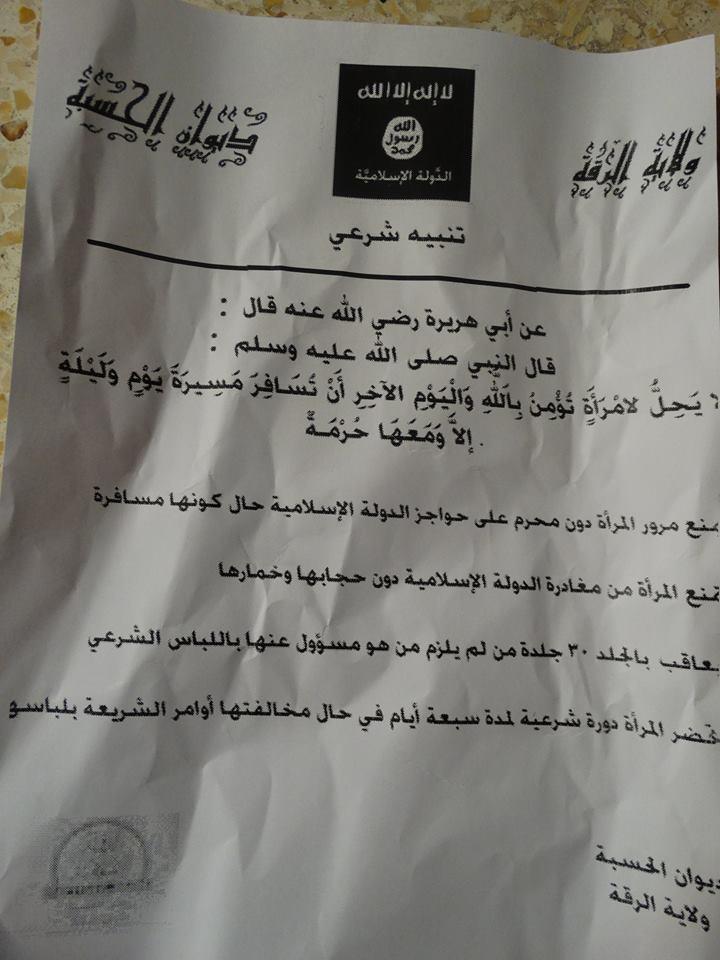
Wilayat al-Raqqa
Diwan al-Hisba
Shari’i notification
On the authority of Abu Huraira may God be pleased with him: he said: the Prophet (SAWS) said: “It is not allowed for a women who believes in God and the Last Day to travel by day or night unless she has a guardian with her.”
It is forbidden for the women without a mahrim [male guardian] to pass over the Islamic State checkpoints in the event she is travelling.
It is forbidden for the women to depart the Islamic State without her hijab and veil.
The one who is responsible for her and does not make her comply with Shari’i dress will be punished by flogging 30 times.
The women is to attend a Shari’a session for 7 days in the event of her violation of the orders of Shari’a regarding dress.
Diwan al-Hisba
Wilayat al-Raqqa
Specimen N: Fuel blockade on areas outside IS control in Aleppo and Idlib
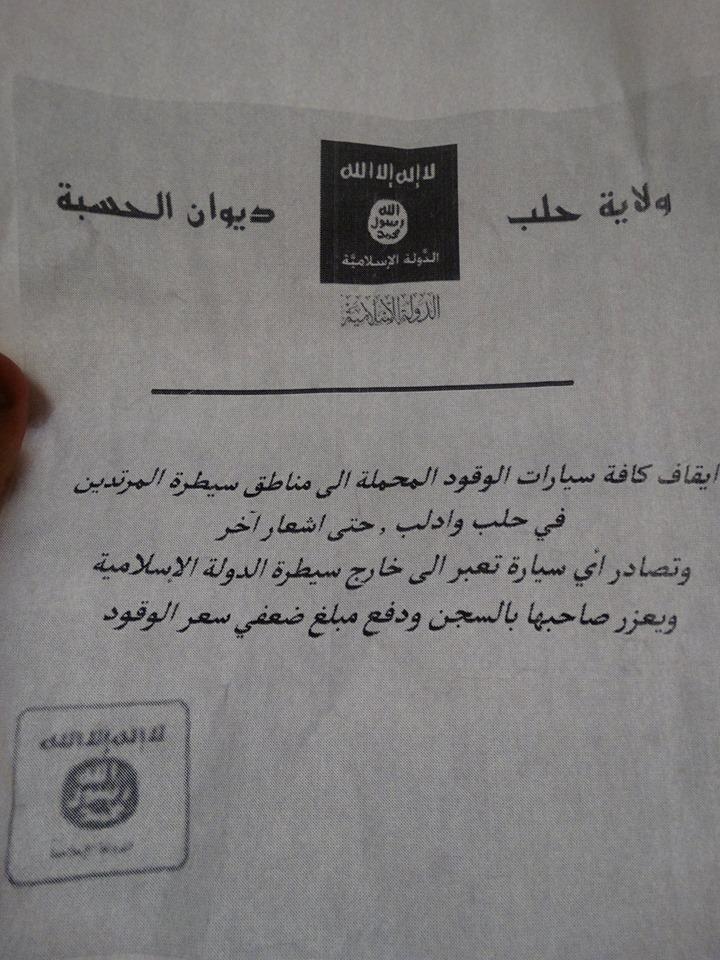
Islamic State
Wilayat Halab
Diwan al-Hisba
All vehicles bearing fuel are to be stopped from heading to areas controlled by the apostates in Aleppo and Idlib until further notice. And any vehicle attempting to cross to areas outside the control of the Islamic State is to be confiscated, and its owner will be reprimanded with imprisonment and paying a sum double the price of the fuel.
Notes: This blockade was imposed following IS’ offensive launched in north Aleppo countryside in late May. A respite came at the end of June with a lull in the clashes and a deal between rebels and IS to allow mutual exchange of fuel and goods, but fighting has since reignited and continued, and transportation of goods and cash between areas remains difficult but possible.
Specimen O: Formation of women’s Hisba oversight team in Mosul
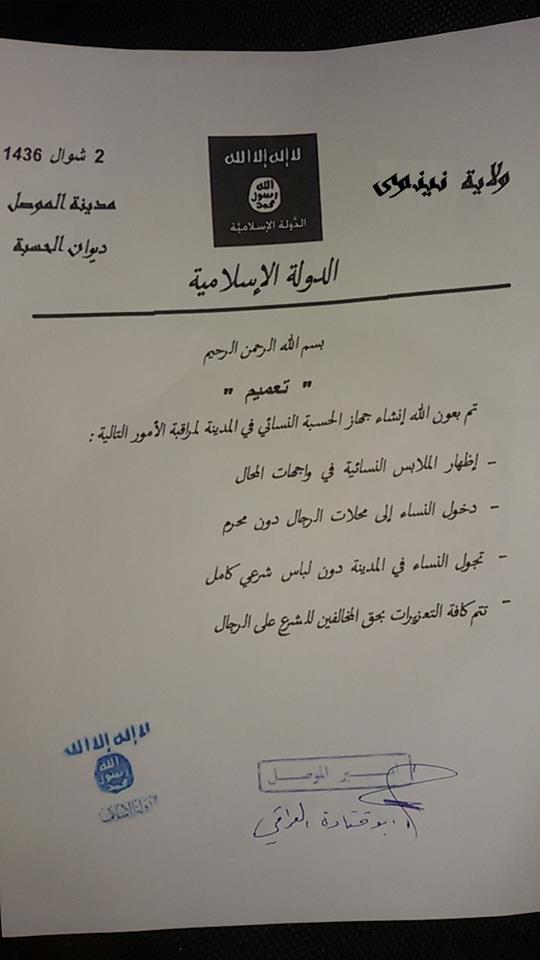
Islamic State
Wilayat Ninawa
2 Shawwal 1436 AH [19 July 2015]
City of Mosul
Diwan al-Hisba
In the name of God, the Compassionate, the Merciful:
Statement for distribution
By God’s help the women’s Hisba team has been established in the town to oversee the following matters:
– Display of women’s clothes in the shop displays.
– Entry of women into men’s shops without a mahrim.
– Women moving about in the city without full Shari’i dress.
– Fulfilling all the reprimand consequences with regards to those who violate the law upon men.
Islamic State
Amir of Mosul
Abu Qatada al-Iraqi
Notes: The prototype for this set-up was the ‘al-Khansaa Battalion’ set up to recruit women and to enforce Shari’a law in Raqqa city after the ISIS takeover in January 2014. We also learn here the name of the IS governor of Mosul. On the whole, Iraqis unsurprisingly seem to play a disproportionate role in governor positions, particularly the provincial level: cf. Abu Anas al-Samarra’i [of Samarra] the governor of Euphrates Province, Abu Osama al-Iraqi one-time of Hasakah province, Abu Ayman al-Iraqi once of Latakia, then of Anbar (both Abu Osama and Abu Ayman deceased).
Specimen P: Shop conduct regulations for women
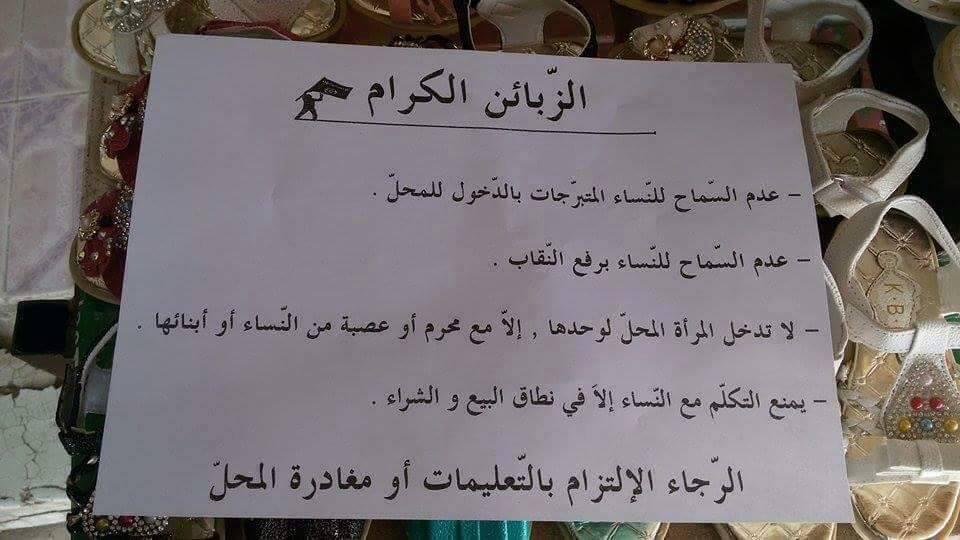
Dear customers,
– Adorned women may not enter the shop.
– Women may not raise their niqab.
– The woman is not to enter the shop alone, unless she has a mahrim or group of women or her sons with her.
– No talking with women except on points of buying and selling.
Please follow the instructions or leave the shop.
Notes: Dating and origin uncertain.
Specimen Q: Hisba regulations against smoking, Hit, Anbar Province
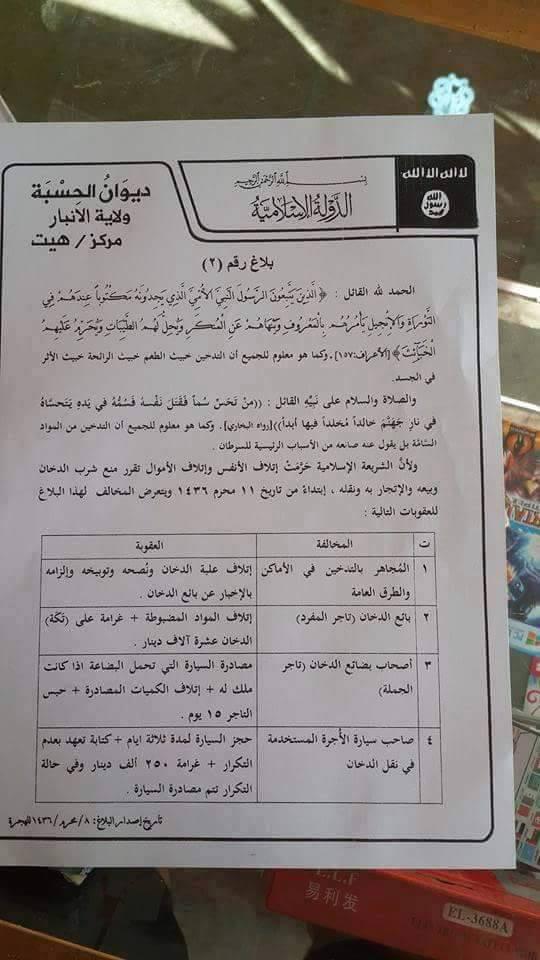
In the name of God, the Compassionate, the Merciful
Islamic State
Diwan al-Hisba
Wilayat al-Anbar
Centre: Hit
Notification no. 2
Praise be to God who says: “Those who follow the Messenger, the illiterate Prophet whom they find written about among them in the Torah and Gospel, who commands them with what is right and forbids them from what is wrong, makes lawful to them good things and forbids them from evil things”- al-‘Araf 157 [Qur’an 7:157]. And it is known to all that smoking is evil of consumption, evil of odour and evil of pain in the body.
And prayers and peace be upon His Prophet who says: “Whoever sips poison, kills himself, so he will sip this poison in his hand forever and ever in Hellfire”- narrated by Bukhari. And similarly it is known to all that smoking is not only composed of toxic substances but also addiction to it is said to be among the main causes of cancer.
Since the Islamic Shari’a has forbidden harming oneself and wealth, it is decided to forbid smoking as well as selling it, dealing in it and transporting it, beginning from 11 Muharram 1436 AH, and the violator of this notification will be subject to the following consequences.
| Number | Violation | Consequence |
| 1 | Smoking openly in public places and roads | Destruction of the case of cigarettes, advising him, rebuking him and making him embrace the news of the notification on smoking |
| 2 | Selling cigarettes (dealing in isolation) | Destruction of the seized goods and fine on e-cigarettes: 10,000 dinars. |
| 3 | Owners of smoking goods (dealing in whole) | Confiscating the car bearing the goods if it belongs to him, and destroying the confiscated quantities and detaining the dealer for 15 days. |
| 4 | Owner of a taxi used to transport cigarettes | Detaining the car for three days, and a written pledge not to repeat the offence and a fine of 250,000 dinars, and in the event of repeated offence the car will be confiscated. |
Date of publication: 8 Muharram 1436 AH [2 November 2014]
Notes: Hit fell to IS in October 2014 after many months of stubborn resistance. Note how a small period elapsed before the Hisba regulations were imposed.
Specimen R: Hisba regulations on women’s dress, Hit, Anbar Province
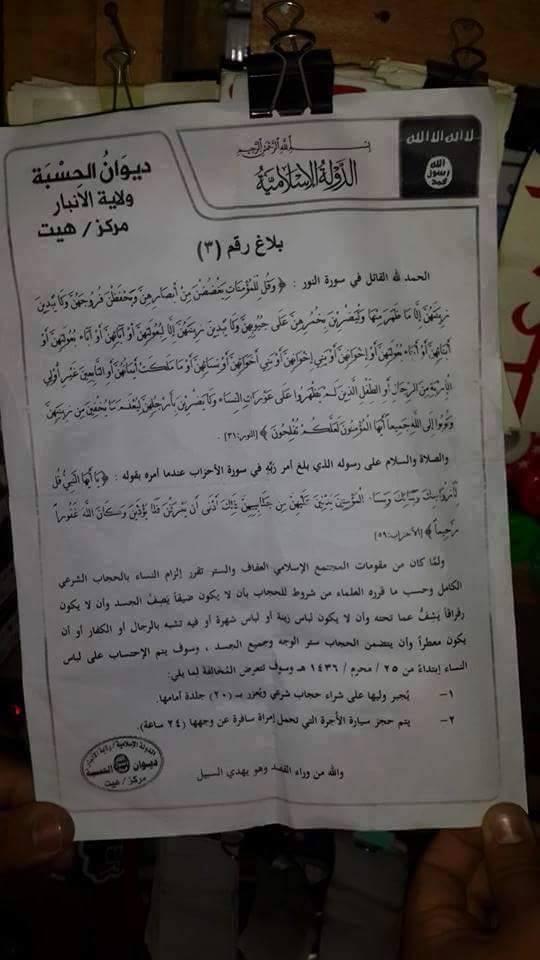
In the name of God, the Compassionate, the Merciful
Islamic State
Diwan al-Hisba
Wilayat al-Anbar
Centre: Hit
Notification no. 3
Praise be to God who says in Surat al-Nur: “And tell the believing women to reduce their sight and guard their private parts and not to flaunt their adornments, except what has appeared by necessity. And tell them to wrap a portion of their veils over their chests and not expose their adornments except to their husbands, fathers, husbands’ fathers, sons, husbands’ sons, brothers, brothers’ sons, sisters’ sons, women, that which their right hands possess, male attendants who have no sexual desire, or children who do not yet know of women’s genitals. Let them not stomp to make it known what they are concealing of their adornments. And repent to God, all of you, oh believers; peradventure you will succeed”- al-Nur 31 [Qur’an 24:31].
And prayers and peace be upon the Messenger of God who brought the command of His Lord in Sura al-Ahzab when He commanded him with His words: “Oh Prophet, tell your wives, daughters and women of the believers to bring down the outer garments over themselves. That is more fitting that they should be known and not abused. And God is ever forgiving, merciful”-Ahzab 59 [Qur’an 33:59].
Since integrity and protection have been among the basic components of Islamic society, it is decided to make women embrace the entire Shari’i hijab and according to what the ‘ulama have stipulated among the conditions of the hijab: that it should not be tight-fitting for the body, nor should it be delicate and transparent for what is underneath it, nor should it be adorned dress, dress of renown, or imitating men or the disbelievers. Nor should it be perfumed, but the hijab should include veiling the face and all the body. And women will be held accountable for clothing beginning from 25 Muharram 1436 AH [19 November 2014], and violation will be subject to the following consequences:
1. Her guardian will be made to buy a Shari’i hijab and will be reprimanded with 20 lashes in front of her.
2. A taxi bearing that carries a woman with her face uncovered will be detained for 24 hours.
Islamic State: Wilayat al-Anbar
Diwan al-Hisba
Centre: Hit
Specimen S: Marriage Contract, Mosul
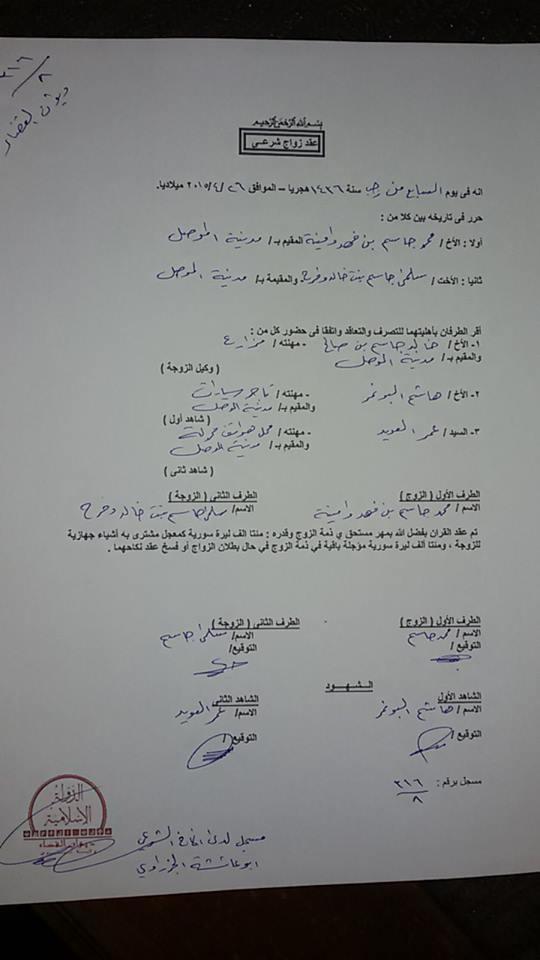
Diwan al-Qada
316/8
In the name of God, the Compassionate, the Merciful
Shari’i Marriage Contract
Today is 7 Rajab 1436 AH corresponding to 26 April 2015.
Published on this date between the two comprising:
1. The brother Muhammad Jasim Fahad Wafiya who lives in the city of Mosul.
2. The sister Salma Jasin Bint Khalid Wafrah, who lives in the city of Mosul
The two have determined their suitability to conduct and contract to marriage and have agreed in the presence of:
1. The brother Khalid Jasim bin Saleh. Occupation: farming. Lives in the city of Mosul (wife’s guardian).
2. The brother Hashim Albu Nimr. Occupation: car dealer. Lives in the city of Mosul (first witness).
3. Mr. Omar al-Adid. Occupation: mobile phone shop. Lives in the city of Mosul (second witness).
The first side (husband): Muhammad Jasim bin Fahad Wafiya
The second side (wife): Salma Jasim bint Khalid Wafrah
The contract of the Qur’an has been fulfilled by God’s favour with a deserving dowry: i.e. contract of the husband, and its extent is: 200,000 Syrian pounds as an upfront purchase for the wife’s preparations, and 200,000 Syrian pounds as a postponed remainder in the event of the falsity of the marriage or invalidation of the marriage contract.
The first side (husband): Muhammad Jasim bin Fahad Wafiya
Signature:
The second side (wife): Salma Jasim bint Khalid Wafrah
Signature:
The witnesses
First witness: Hashim Albu Nimr.
Signature:
Second witness: Omar al-Adid
Signature:
Registration number: 316/8
Registered with the Shari’i brother Abu A’isha al-Jazrawi.
Islamic State
Diwan al-Qada
Notes: Interesting to note the use of Syrian currency in the dowry payments even though the marriage contract is for people living in Mosul. The Abu A’isha al-Jazrawi in this document should not be confused with the one-time amir of Azaz of the same kunya who replaced Abu Abd al-Rahman al-Kuwaiti and was killed in the infighting with Syrian rebels in early 2014. The establishment of the Islamic court (i.e. of what is now the Diwan al-Qada [wa al-Mazalim]) with offers to conduct marriages is (alongside the da’wa office) one of the earliest features of ISIS administration in Syria in 2013, being set up in e.g. Deir az-Zor city in the fall of 2013 at a time when other factions existed in the city. When Mosul fell in June 2014, an Islamic court quickly emerged, only this time there were no rivals to challenge what became the Islamic State and so marriages could only be legally held there.
Specimen T: Marriage Contract
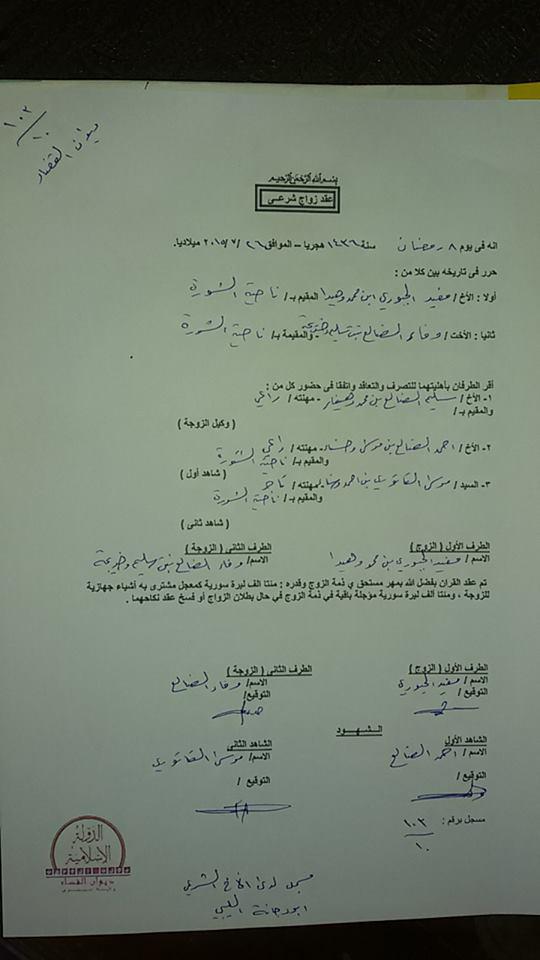
Diwan al-Qada
103/10
In the name of God, the Compassionate, the Merciful
Shari’i Marriage Contract
Today is 8 Ramadan 1436 AH corresponding to 26 June 2015
Published on this between the two comprising:
1. The brother Hafid al-Juburi ibn Muhammad Wahida, who lives in al-Shura district [agricultural district south of Mosul]
2. The sister Wafa al-Saleh bint Salim wa Khadija, who lives in al-Shura district
The two have determined their suitability to conduct and contract to marriage and have agreed in the presence of:
1. The brother Salim al-Saleh bin Muhammad wa Haifa. Occupation: farmer (wife’s guardian).
2. The brother Ahmad al-Saleh bin Mursa wa Sara. Occupation: farmer. Lives in al-Shura district (first witness).
3. Mr. Musa al-Qaturi [?] bin Ahmad wa Huna. Occupation: merchant. Lives in al-Shura district (second witness).
The first side (husband): Hafid al-Juburi ibn Muhammad Wahida
The second side (wife): Wafa al-Saleh bint Salim wa Khadija
The contract of the Qur’an has been fulfilled by God’s favour with a deserving dowry: i.e. contract of the husband, and its extent is: 200,000 Syrian pounds as an upfront purchase for the wife’s preparations, and 200,000 Syrian pounds as a postponed remainder in the event of the falsity of the marriage or invalidation of the marriage contract.
The first side (husband): Hafid al-Juburi ibn Muhammad Wahida
Signature:
The second side (wife): Wafa al-Saleh bint Salim wa Khadija
Signature:
The witnesses
First witness: Ahmad al-Saleh
Signature:
Second witness: Musa al-Qaturi
Signature:
Registration no. 103/10
Registered with the Shari’i brother Abu Dujana al-Libi [the Libyan]
Islamic State
Diwan al-Qada
Specimen U: Regulations for bakeries, Hit, Anbar Province
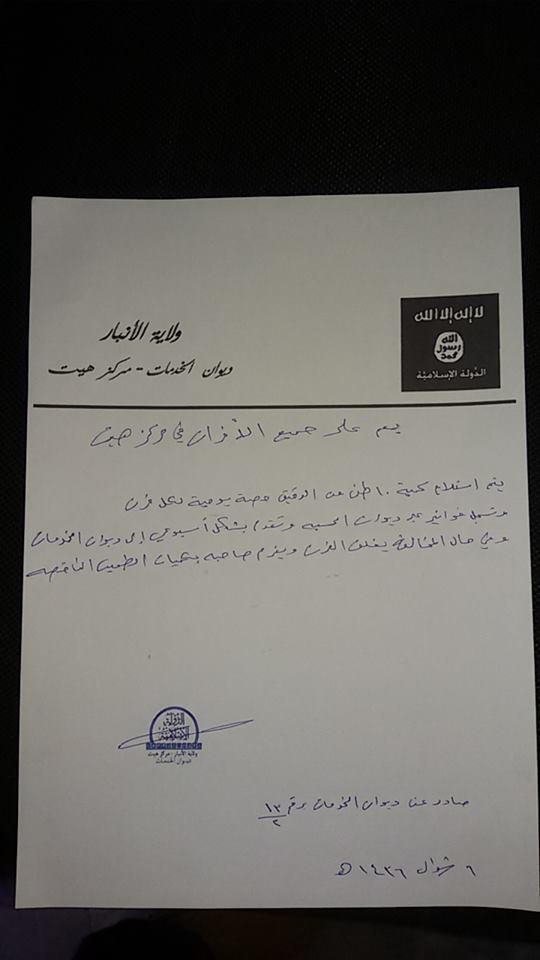
Islamic State
Wilayat al-Anbar
Diwan al-Khidamat: Hit centre
Publication for all the bakeries in Hit centre
A quantity of 10 tonnes of flat loafs of bread is to be received as a daily quota for every oven with inclusion of receipts through the Diwan al-Hisba that on a weekly basis will be referred to the Diwan al-Khidamat. And in the event of violation the bakery will be closed and its owner will be fined according to the quantities missing in tonnes.
Islamic State
Wilayat al-Anbar: Hit centre
Diwan al-Khidamat
Issued by the Diwan al-Khidamat no. 13/2
6 Shawwal 1436 AH [22 July 2015]
Specimen V: Request for garbage compactors, Hit, Anbar
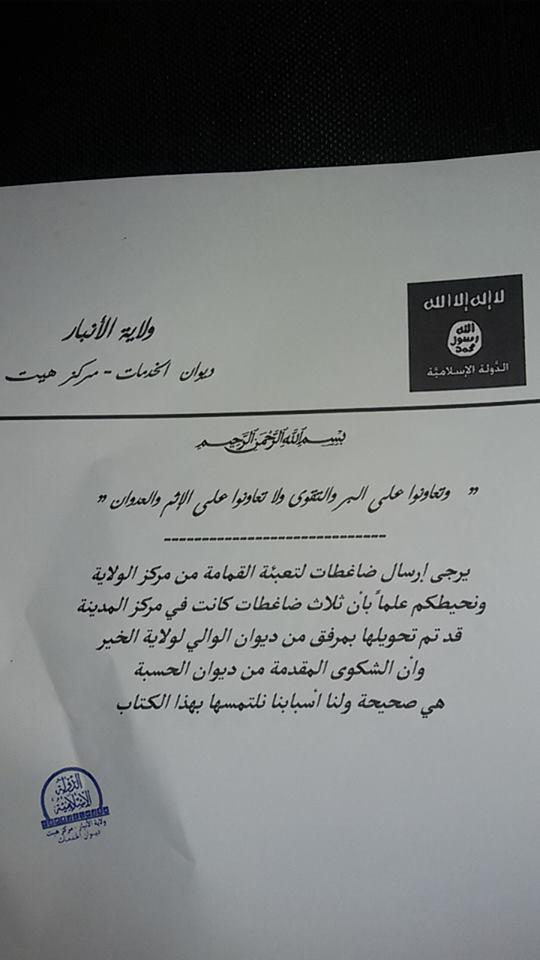
Islamic State
Wilayat al-Anbar
Diwan al-Khidamat: Hit Centre
In the name of God, the Compassionate, the Merciful
“And cooperate on the basis of piety and fear of God, not sin and hostility.”
It is requested to send compactors for the loading of garbage from the centre of the wilaya. And we inform you that three compactors were in the centre of the town and were moved through facilitation of the Diwan al-Wali to Wilayat al-Kheir [Deir az-Zor province]. And the complaints presented from the Diwan al-Hisba are true and are our reasons that solicit us to write this note.
Islamic State
Wilayat al-Anbar: Hit Centre
Diwan al-Khidamat
Notes: Diwan al-Wali= Diwan al-Wilaya. Exact dating uncertain
Specimen W: Prohibition on mortgaging homes, Hit, Anbar
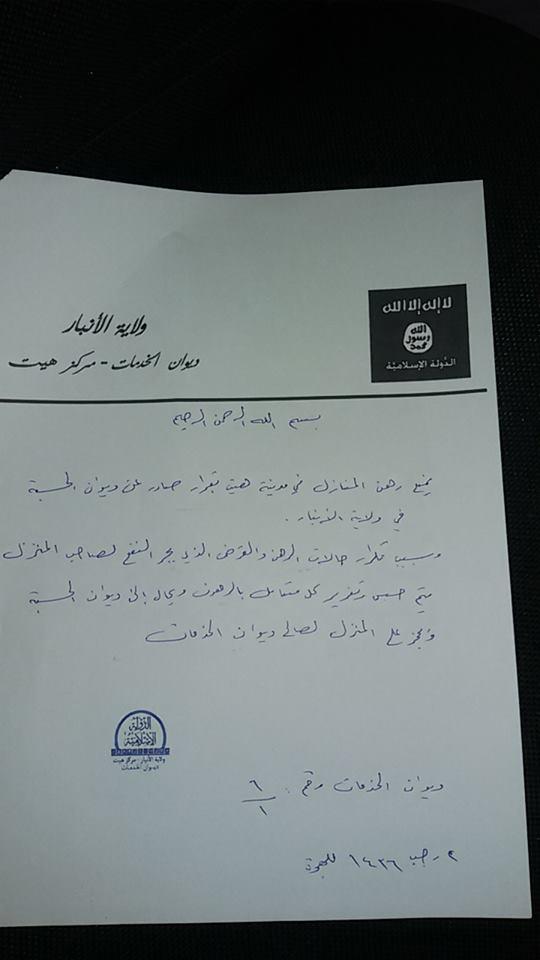
Islamic State
Wilayat al-Anbar
Diwan al-Khidamat: Hit Centre
In the name of God, the Compassionate, the Merciful
The mortgaging of homes in the town of Hit is forbidden by order of the Diwan al-Hisba in Wilayat al-Anbar.
On account of the frequency of the states of mortgage and the loan that brings along interest for the owner of the house [cf. here for context] all who deal in mortgages will be detained, reprimanded and referred to the Diwan al-Hisba, and the house will be confiscated for the interest of the Diwan al-Khidamat.
Islamic State
Wilayat al-Anbar: Hit Centre
Diwan al-Khidamat
Diwan al-Khidamat no. 6/1
2 Rajab 1436 AH [21 April 2015]
Specimen X: Request for broadcast of media release, Ninawa Province
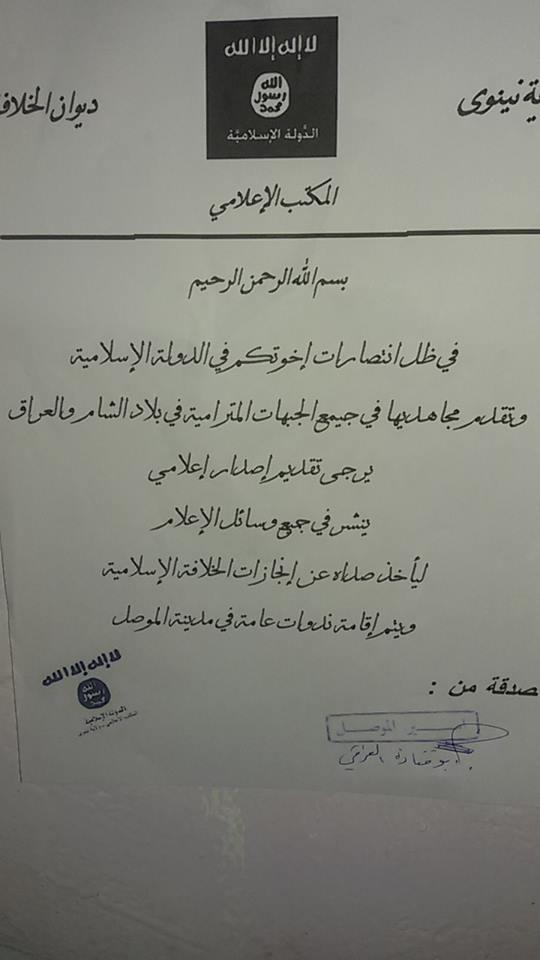
Islamic State
Diwan al-Khilaf[a?]
Wilayat Ninawa
Media Office
In the name of God, the Compassionate, the Merciful
In the shade of the victories of your brothers in the Islamic State, and the advance of its mujahideen on all extensive fronts in Bilad al-Sham and Iraq, the presentation of a media release is requested, which will be published in all media outlets, so as to take an echo from the successes of the Islamic Caliphate, and hold public seminars in the city of Mosul.
Islamic State
Media Office for Wilayat Ninawa
Certified by the amir of Mosul: Abu Qatada al-Iraqi
Notes: Likely dates from the aftermath of the conquests of Ramadi and Palmyra in May 2015: cf. Specimen 4H in my archive with offer for free entry to the Waritheen hotel and amusement park in Mosul in celebration of the conquests.
Specimen Y: Request for dispatch of personnel contingent and weapons, Azaz
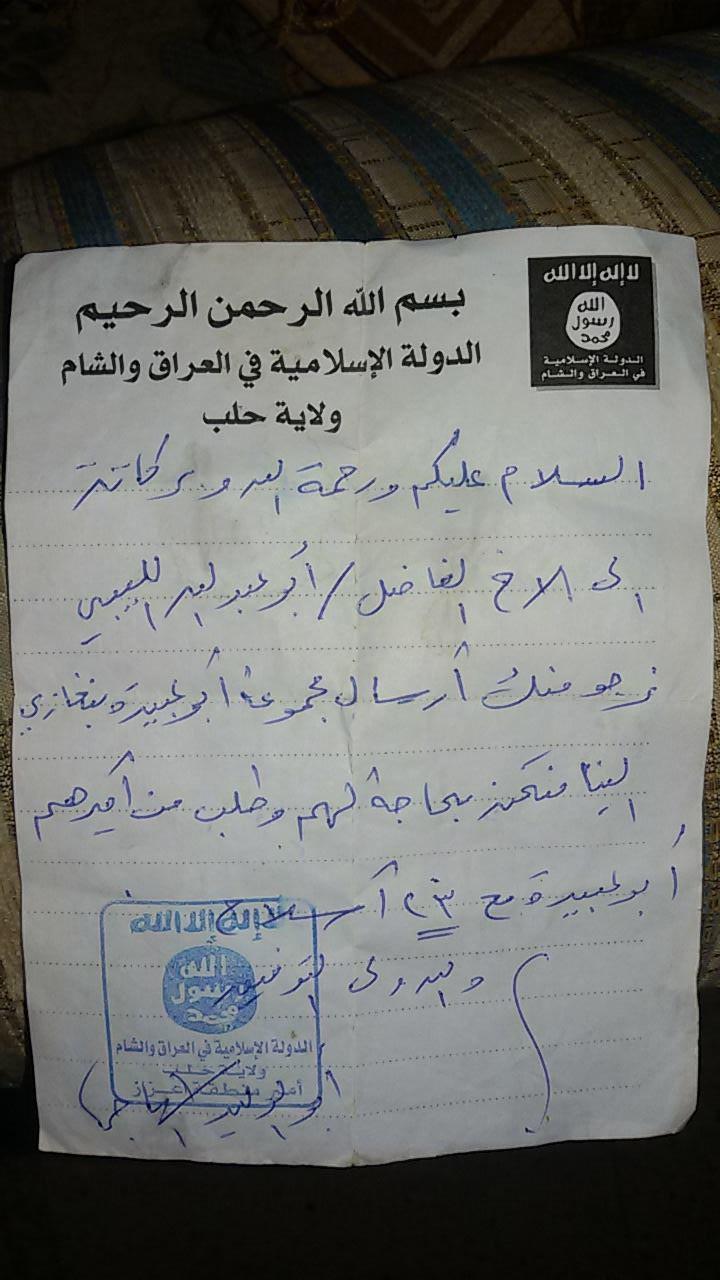
In the name of God, the Compassionate, the Merciful
Islamic State in Iraq and al-Sham
Wilayat Halab
Salam alaykum wa rahmat Allah wa barakatuhu. To the distinguished brother Abu Abdullah al-Libi, we ask you to send Abu Obeida al-Benghazi’s group to us for we are in need of them and to ask for weapons from their amir Abu Obeida.
[…]
Islamic State in Iraq and al-Sham
Wilayat Halab
Amir of the Azaz area
Abu al-Waleed al-Muhajir
Notes: Abu al-Waleed al-Muhajir is otherwise unknown. He was never the amir of the Azaz area: it is just this document has the amir’s stamp. Dating unclear, though it may relate to the conflict with the Northern Storm Brigade that began in September 2013.
Specimen Z: Punishments for not closing shop during prayer time, Homs Province
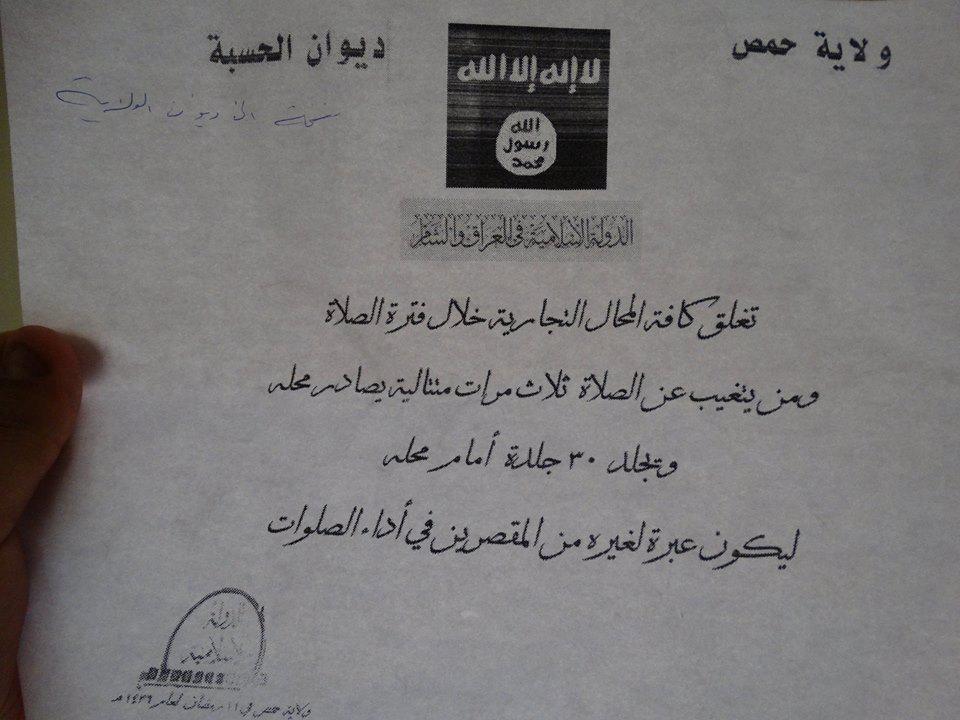
Wilayat Homs
Diwan al-Hisba
All shops are to be closed during prayer time. Whoever is absent from prayer three times in a row will have his shop confiscated and flogged 30 times in front of his shop, to be an example to others besides him from those falling short in undertaking prayers.
Islamic State
Wilayat Homs: 11 Ramadan 1436 AH [28 June 2015]

2 Replies to “The Archivist: 26 Unseen Islamic State Administrative Documents: Overview, Translation & Analysis”
Comments are closed.